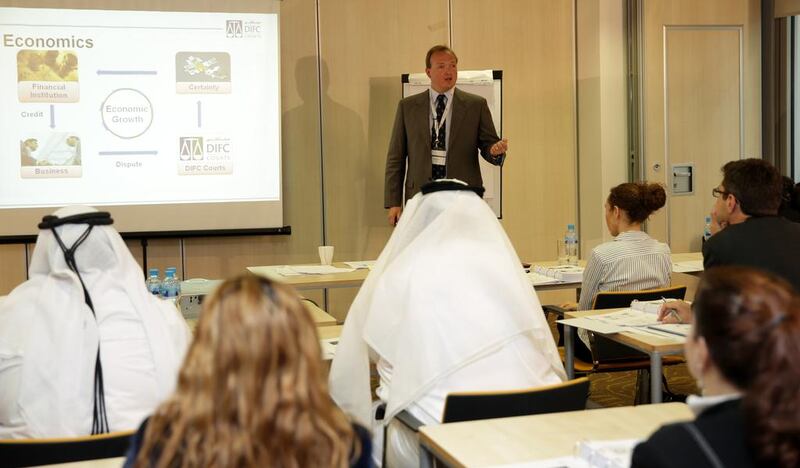DUBAI // The Dubai International Financial Centre’s Courts are doing their part to help train local lawyers.
A 13-week course brings together experts from DIFC and judges to familiarise lawyers with the centre’s laws and procedures as an introduction to English common law.
Most locally trained lawyers are only taught Sharia and civil law, so they are unable to deal with the range of cases that come up in the UAE’s international business environment.
During the 13 weeks they are exposed to subjects such as commercial and employment law. The courses began 18 months ago.
Natasha Bakirci, head of training at DIFC courts, said lawyers from several nationalities – not least Emiratis – had taken the course, prompting the launch of an Arabic language option last September.
The intensive two-day programme will run again next month. “These lawyers want to be able to advise clients fully with options before both the DIFC and Dubai Courts,” Ms Bakirci said.
Advocacy training was recently added to the course.
“A lot of lawyers may not have the confidence to stand up in front of a common law judge so we brought experts from England to Dubai,” said Ms Bakirci.
The course includes exercises in areas such as cross-examination to give the lawyers hands-on experience.
“It’s much more attractive for a law firm that wants to train its lawyers on these kinds of techniques to send them to Dubai than all the way to London,” Ms Bakirci said.
“It’s the only course like this in the region so we’ve had interest and participants from people in several countries in the GCC already.”
Accredited by the Solicitors Regulation Authority in London and the Bar Standards Board, the courses are all internationally recognised.
Mark Beer, head of the DIFC Courts, said such training was invaluable.
“For lawyers at the lower end of the pay scale, it’s been very difficult to get training because they’d have to travel somewhere to learn common law,” Mr Beer said.
“It’s not only relevant for the DIFC Courts but the lawyers will be involved in international disputes for their clients, civil litigation.
“There are so many international companies here now so you have to understand different systems to be able to help them.
“To be a leading business centre, you need to have these legal systems in place and this is one of the visions for Dubai 2021.”
The courts are now linking up with local institutions such as the Sharjah and Dubai judicial institutes and the American University of Dubai to help diversify their own curricula.
“In time there will be courses at the University of Dubai [which last year launched an English language law degree] where students can learn about the different systems so when they graduate, they will be international students,” said Mr Beer.
mswan@thenational.ae






